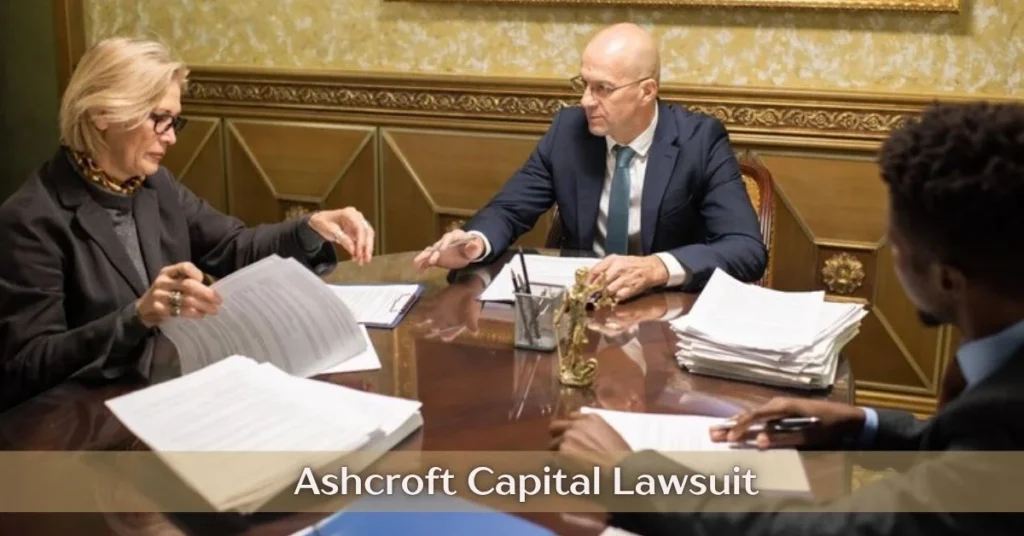Introduction to Ashcroft Capital
Investing in real estate can be a lucrative venture, offering substantial returns and financial growth. However, it also comes with inherent risks. One such case that has captured the attention of the investment community is the Ashcroft Capital lawsuit. This legal battle has raised concerns among investors, sparking discussions about accountability, transparency, and risk management in real estate investments. As the case unfolds, many are left questioning its impact on their portfolios and the industry as a whole.
In this article, we will explore the details of the lawsuit, its implications for investors, and what this means for the future of real estate investing.
Overview of the Lawsuit Against Ashcroft Capital
The Ashcroft Capital lawsuit has gained significant media attention due to the claims of substantial investment losses linked to the firm’s practices.
Key Allegations
- Misleading Information: Investors claim that Ashcroft Capital misled them about the potential returns and risks associated with certain real estate projects.
- Lack of Transparency: The lawsuit alleges that the company was not fully transparent about the risks involved and may have selectively reported financial data.
- Breach of Trust: The legal action raises serious concerns about accountability within the company and its communication with investors.
This case not only threatens Ashcroft Capital’s reputation but also raises broader questions about investor rights and corporate governance in the real estate industry.
Potential Industry Impact
The outcome of this lawsuit could have far-reaching implications for the real estate investment industry. It may set a precedent for future cases involving investment firms and could lead to increased scrutiny of how these firms manage investor funds.
The Allegations and Claims Made by Investors
The core of the Ashcroft Capital lawsuit centers on accusations of mismanagement and misleading communication regarding investment performance.
Key Claims by Investors
- Overly Optimistic Projections: Investors argue that the financial projections presented by Ashcroft Capital were unrealistic, leading to significant losses when the anticipated returns did not materialize.
- Selective Financial Reporting: Some investors assert that Ashcroft Capital engaged in selective reporting of asset performance, withholding critical information about underperforming investments.
- Misallocation of Funds: There are also claims that investor funds were not allocated as initially outlined, leading to further distrust among stakeholders.
These allegations have left many investors questioning the firm’s transparency practices and its commitment to their financial well-being.
Ashcroft Capital’s Response to the Allegations
In response to the lawsuit, Ashcroft Capital has made several public statements defending its actions.
Company’s Defense
- Commitment to Transparency: Ashcroft Capital asserts that it has always followed legal guidelines and maintains open communication with its investors.
- Track Record of Success: The firm points to its history of successful real estate investments as evidence that its business practices are sound.
- Ongoing Dialogue: Ashcroft Capital has encouraged ongoing dialogue with investors and emphasized its willingness to address concerns directly.
Despite these efforts to rebuild trust, the company faces an uphill battle in restoring its reputation and credibility.
The Impact of the Lawsuit on Investors and the Real Estate Industry
The Ashcroft Capital lawsuit has sent shockwaves through the investment community, with significant implications for both investors and the broader real estate market.
Impact on Investors
- Financial Uncertainty: Investors are grappling with financial losses and a loss of trust in the firm, leaving many uncertain about the future of their investments.
- Fear of Future Losses: This lawsuit has created a ripple effect, with potential investors expressing concerns about the risks involved in future real estate investments.
Impact on the Real Estate Industry
- Erosion of Trust: As real estate is generally considered a stable investment, legal battles like this can shake investor confidence across the industry.
- Slowed Market Activity: If trust in investment firms falters, property values could be affected, leading to fewer transactions and new developments.
- Broader Industry Repercussions: Real estate professionals are watching closely, knowing that reputational damage can extend beyond just one company, affecting market dynamics at large.
Steps Investors Can Take to Protect Themselves
In light of the Ashcroft Capital lawsuit, it is important for investors to take proactive steps to safeguard their investments.
Key Strategies for Protecting Investments
- Conduct Thorough Research: Always research a company’s history, management, and track record before investing.
- Diversify Your Portfolio: Spread your investments across multiple sectors to reduce the risk associated with any single asset.
- Consult Financial Experts: Seek advice from financial advisors or legal professionals, particularly those with expertise in real estate or securities law.
- Stay Informed: Keep up to date with legal matters involving the companies you invest in. Legal disputes can significantly impact a company’s stock price and overall stability.
- Maintain Detailed Records: Keep comprehensive records of all transactions, communications, and documents related to your investments. These can be crucial in case of future disputes.
Conclusion: The Importance of Due Diligence in Investing
The Ashcroft Capital lawsuit serves as a stark reminder of the risks involved in investing. While real estate has long been seen as a stable asset class, incidents like this highlight the importance of thorough research and proactive risk management.
Key Takeaways
- Always conduct due diligence before making any investment decision.
- Regularly review the performance of your investments and stay informed about any legal developments involving the companies you’ve invested in.
- Diversify your portfolio to mitigate risks associated with specific companies or sectors.
By following these best practices, investors can better protect themselves from unforeseen challenges and navigate the complex landscape of real estate investing.
FAQs
What is the Ashcroft Capital lawsuit about?
The Ashcroft Capital lawsuit involves investors claiming significant financial losses due to misleading information about investment returns and risks. The lawsuit also raises concerns about transparency and mismanagement.
How is Ashcroft Capital responding to the allegations?
Ashcroft Capital has defended its actions, emphasizing its commitment to transparency, adherence to legal guidelines, and a strong track record in real estate investment.
How can this lawsuit impact investors?
Investors may face financial losses, and the lawsuit could reduce confidence in real estate investments, potentially leading to slower market activity and a decrease in property values.
What steps can investors take to protect themselves?
Investors can protect themselves by conducting thorough research, diversifying their portfolios, consulting financial experts, staying informed about legal developments, and maintaining detailed records of transactions.
What lessons can be learned from the Ashcroft Capital lawsuit?
The lawsuit underscores the importance of due diligence, transparency, and accountability in real estate investments. Investors must stay proactive in managing risks and regularly review the performance of their investments.






